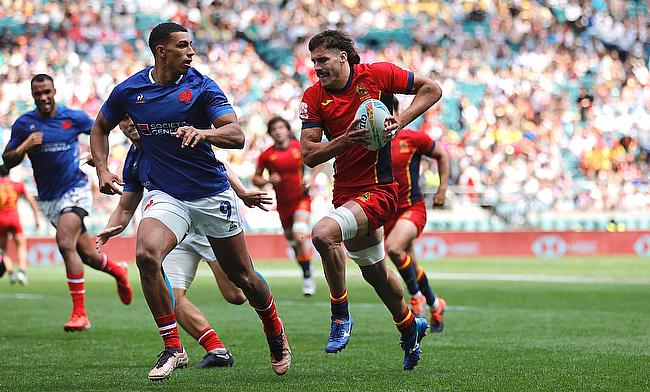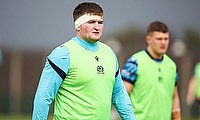Watch out for Spain in 2024 - They will be a top contender to qualify for the next World Cup

Spain have been able to have both the men’s and the women’s teams in the World 7s Series, while the U20s are in the top tier of their youth grade
©Mike Lee - KLC fotos for World Rugby
It is safe to say 2024 must mark the start of a new era for Spain.
And it has to end with World Cup qualification.
The Leones' last Rugby World Cup appearance was in 1999, and after getting disqualified from 2019 and 2023, 2027 is seen as the ultimate goal, one that Pablo Bouza, Spain’s new head coach (played in 2003 RWC for Argentina), will have to take head-on.
Spain’s path to the next Rugby World Cup will have to go through Georgia, Portugal, and Romania, the three top contenders to grab two of the three Rugby World Cup European tickets (might become four with the incoming qualifying changes).
This presents a massive challenge and one that Spain have completed in the past, but due to player eligibility reasons, they would surrender their 2023 RWC spot.
Juan Carlos Martín Sánchez, the Spanish Rugby Union president since 2022, and his team have established a plan for the next four years, with their focus set on continuing to develop the youth base, raising the local club competition level, and pushing for the national team to become a force to be reckoned with.
With the recent success of the U20s – they will be playing in the next U20 Rugby World Cup – the momentum is quietly building up for Spain, and now the pressure is on the senior team, as they need to sort it out.
Who’s going to be in their plans? Will Spain only focus on home-grown players? Can they mount a tremendous challenge as done between 2017 and 2022?
Bouza’s team plan: What is it?
Concerning the first two questions, Bouza in his first press conference hinted at what may be his plan for Spain and who we might see donning the red and blue jersey.
He and his staff are already focused on following players residing in Spain, but athletes featuring in the Top14, ProD2 or Nationale teams will also be called upon if they have already made a connection with Spain.
This means that players living outside of the country who haven’t played as U18, U20, or as a senior can not be included in future calls, but only time will tell if this decision will be upheld.
The former Pumas international will only call those that will be 100 per cent available to play for Los Leones, which can be seen as a draconian decision, as neither Georgia, Portugal nor Romania have gone this way before. Nonetheless, a sort of agreement might be achieved as having units like Joel Merkler, Samuel Ezeala, Asier Usarraga, Fred Quercy, Kerman Aurrekoetxea, Jon Zabala, and others can help them get much closer to a World Cup dream.
As the number of Spanish youngsters departing for French clubs is rising by the year, it will be vital to build a steady bridge to make sure Spain can have its best possible team to compete against the likes of “Lelos”, “Lobos” and “Oaks”. Alvaro Garcia, Ekain Imaz (capped in the La Vila tournament this November) and Mario Pichardie are some of those new kids on the block who need a proper project so they can give their all for their country.
Gameplan and new (happier) horizons
It’s still early to know what type of gameplan Bouza might want to implement, but if the new head coach can help Spain climb a level up from what we saw in 2022 (only one defeat in five matches in the Rugby Europe Championship), then they will impress and even become Rugby Europe’s number two team.
Yes, 2023 wasn’t a good year, but it should be taken with a pinch of salt, as Santi Santos was on his way out, and the team was under serious reconstruction. In the last three seasons, Spain won 11 out of 21 games, and in their best year, they only lost two out of eight, taking down Romania and
Portugal, for example.
There are already some new patterns being tested, with the three-man pods and a riskier approach when moving the ball, remembering the South American flair seen in Argentina or Uruguay.
The fact remains that the Spanish Rugby Union can become a sort of juggernaut given time as long as they don’t make any more administrative mistakes like in 2018 and 2022.
With almost 40,000 players registered to play rugby, Spain has been able to have both the men’s and the women’s teams in the World 7s Series, while the U20s are in the top tier of their youth grade, enough proof that they are seated on a gold nugget.
There’s a good outlook for Spain as they continue to pipeline young players to some of the best clubs in the rugby world while the union is trying to rebuild itself and deliver what has been in the making for the past 10 years: A sport strong enough to make noise in their home country and achieve greatness.
The 2027 Rugby World Cup might seem to be in the distance, but Sánchez, Bouza, and everyone else’s work has already started in 2023.









